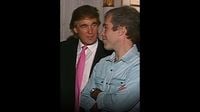The Jeffrey Epstein scandal has once again thrust former President Donald Trump into the political spotlight, amid growing controversy and accusations of a cover-up involving key figures in the Trump administration and Congress. On July 23, 2025, reports emerged that Attorney General Pam Bondi informed Trump in May that his name appeared in Justice Department documents related to the late convicted sex offender Jeffrey Epstein. This revelation, first reported by The Wall Street Journal and corroborated by other outlets, has intensified scrutiny over the administration's handling of Epstein's files and raised questions about transparency and accountability.
According to multiple sources, Bondi briefed Trump during a routine meeting in May 2025, which also included Deputy Attorney General Todd Blanche. During this briefing, Bondi reportedly told Trump that his name was among hundreds mentioned in the re-examined documents connected to Epstein's case. The files also contained sensitive material, including child pornography and victim information, which Bondi advised should not be disclosed publicly. Importantly, appearing in the documents does not imply any wrongdoing by Trump, who has never been accused of criminal activity in connection with Epstein.
Despite this, the White House initially pushed back against the reports. A spokesman for Trump dismissed the story as "fake news," with communications director Steven Cheung accusing Democrats and liberal media of concocting falsehoods. Trump himself denied being told about his name in the files during a June 2025 press interaction, contradicting the account given by Bondi. However, an unnamed White House official later told Reuters that they were not denying Trump's name appeared in the documents, pointing out that earlier releases of Epstein files by the Justice Department had already included Trump's name and phone numbers of some of his family members.
The controversy deepened as a federal judge in Florida denied the Justice Department's request to unseal court files related to Epstein's 2006 prosecution in that state, citing state grand jury secrecy rules. Judge Robin Rosenberg ruled that releasing these transcripts would violate guidelines, and declined to transfer the matter to New York, where separate decisions on unsealing Epstein-related transcripts are pending. The Justice Department had sought to unseal these documents to demonstrate that no stone was left unturned in the investigations, but the court's decision has stymied those efforts.
Meanwhile, the House Oversight Committee has taken a more aggressive stance. On July 23, a subcommittee voted 8-2 to subpoena the Justice Department for its Epstein files, with three Republicans—Nancy Mace, Scott Perry, and Brian Jack—joining five Democrats in support. The subpoena requires the committee chairman, James Comer, to sign off before it becomes official. Additionally, the committee issued a subpoena for testimony from Ghislaine Maxwell, Epstein's convicted accomplice currently serving a 20-year prison sentence for sex trafficking. Maxwell's attorney has indicated that she may testify truthfully if she chooses to comply, while House Speaker Mike Johnson expressed skepticism about her reliability.
The Epstein scandal has stirred significant frustration within Trump's base, especially among those who had been promised the release of incriminating files and a so-called "client list" of individuals associated with Epstein. Earlier in July, the Justice Department and FBI issued a joint memo stating that no such client list existed and affirming that Epstein's death in 2019 was a suicide, countering conspiracy theories that had gained traction among some supporters. This reversal sparked anger and calls for Attorney General Bondi to resign from some of Trump's most ardent followers.
Politically, the Epstein controversy has become a major headache for Trump and his allies. It has overshadowed recent policy successes and complicated efforts to maintain unity within the Republican Party. Speaker Johnson's attempt to cut short congressional voting sessions ahead of the summer recess was widely seen as an effort to quell the escalating pressure for transparency, but it failed to prevent the bipartisan push within the House Oversight Committee to demand the release of the files.
In an attempt to shift focus, Trump has resorted to a familiar political tactic: launching attacks against former President Barack Obama. On July 23, Director of National Intelligence Tulsi Gabbard appeared in the White House briefing room to declassify a congressional report, alleging that the Obama administration orchestrated a campaign to undermine Trump's first presidency through the handling of Russian election interference investigations. Gabbard claimed, "The evidence that we have found and that we have released directly point to President Obama leading the manufacturing of this intelligence assessment." However, this narrative has been widely criticized by Democrats and some intelligence officials as misleading and damaging to U.S. intelligence sources.
Trump's relationship with Epstein dates back to the early 1990s and early 2000s, when the two men were part of overlapping social circles in New York City. Trump has publicly stated that they fell out around 2004 and has claimed to have expelled Epstein from his Mar-a-Lago club for inappropriate behavior. Despite these assertions, photographs and documents have surfaced showing Trump and Epstein together at social events, including a birthday card for Epstein allegedly signed by Trump, which the former president has vehemently denied and is suing over.
The involvement of Deputy Attorney General Todd Blanche, formerly Trump's defense lawyer, in negotiating with Maxwell's attorney adds another layer of complexity and potential conflict of interest to the ongoing investigation. Blanche's role in seeking the release of grand jury transcripts and meeting with Maxwell's legal team has raised ethical questions, given his past representation of Trump and close ties to Maxwell's attorney.
Polling data reveals a divided Republican base regarding Trump's handling of the Epstein files. A Quinnipiac poll from mid-July 2025 showed 40% of Republicans approved of Trump's approach, while 36% disapproved. However, a CBS/YouGov poll indicated that only 11% of Republicans considered Epstein-related issues highly important in evaluating Trump's presidency. The controversy appears to resonate more with traditional Republicans than with the MAGA faction, which remains largely supportive.
The Epstein case continues to be a focal point of political tension and public interest, with calls for transparency clashing against legal restrictions and political maneuvering. As the House Oversight Committee moves forward with subpoenas and the Justice Department maintains its position on protecting victim privacy, the saga is far from over. Trump's attempts to deflect attention through political attacks and conspiracy theories have yet to stem the tide of scrutiny, leaving the Epstein files as a persistent challenge to his political standing and legacy.






